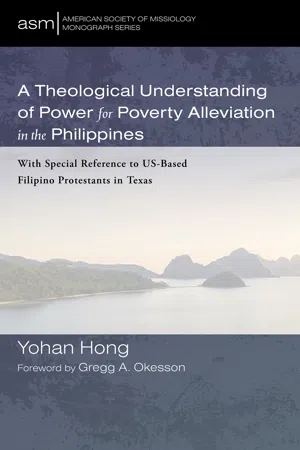![]()
1
Introduction and Research Methodology
In 2006, I walked down a street in Manila, the Philippines’ capital. One girl holding a baby with sad eyes approached me and said, “Give me one dollar.” It did not take long for me to notice that there were plenty of boys and girls begging on the street. Anthony, a second grader in an elementary school in Bulacan, asked me on the street to buy a bundle of sampaguita, the national flower. Daisy, a student of Bulacan State University, had only one meal a day due to lack of money. In Cainta Rizal, a number of people die of dengue fever every year because they do not have money to buy medicine, not enough money even for one pill. While serving as a missionary in the Philippines from 2006 to 2010, I continuously wondered, “Why is there such a huge gap between the poor and the rich?” To my eyes, the reality of everyday people with a low socio-political-economic status was so devastating. The poor seemed incredibly poor and powerless while the rich seemed extremely wealthy, privileged, and powerful. Statistics also verify the devastating reality of the Philippines: 41.5 percent of the national population survive with less than $2 a day as of 2009 and the highest 20 percent of the total population dominate almost the half (49.7 percent) of the entire income in the Philippines as of 2012. Almost half of the total population in the Philippines survive on less than two dollars a day. I sensed that something had been going wrong in the system of politics, economics, and even the mentality of people. In Bulacan, a suburb of Manila (capital), I had a chance to talk with a tricycle driver about his son staying with him during the day, asking “why didn’t you send your son to a school today?” He answered me, “I don’t allow him to go to school.” I asked him back, “For his better future, your son needs to study.” He stared at me for a while and then started to say something surprising: “I know his destiny. He will be a tricycle driver just like me.” It seemed that poverty is a choice of individuals. Beth, an English teacher in Makati, shared with me her bitterness toward the Philippines, saying “our young college graduates are being sold to foreign call centers at a price of $200 a month.” Beth resented the disastrous reality of the Philippines where the government cannot guarantee employment for young people to work and dream of their better future in their home country. She blamed this situation on the government and corrupt political leaders, pointing out this issue as a structural problem, rather than an individual’s choice. Thus, understanding poverty seemed to be a never-ending task; poverty continues to defy simplistic descriptions, definitions, and easy solutions.
One prevailing sense regarding poverty that I received as an outsider in the Philippines was that “everyday people” with a lower socio-economic-political status communicated some expression of powerlessness. I encountered many of them saying that they feel powerless, blaming the elite and the government for poverty and inequality, and consequently perpetuating their image of powerlessness. I also heard people saying “Bahala na,” which generally means “what will be will be” or “I don’t care,” in a way that seems to hint at fatalistic feelings of hopelessness, when they are confronted with challenging situations.
Through these expressions of powerlessness, I found out that poverty is not just a matter of individuals’ lack of material resources; poverty also has social and cultural dimensions. Poverty needs to be understood in the concept of power because everyday people communicate a sense of powerlessness within their day-to-day relationships. Moreover, every relationship is a power relationship whereby power is perceived, negotiated, and exercised by everyday people. Within these power relationships, everyday people experience deprivation, powerlessness, physical isolation, economic poverty, and all other characteristics of poverty. In effect, people are poor and powerless because “there are large-scale practices and a whole system of social roles, often firmly approved by the members of society generally, that cause or perpetuate injustice and misery.” The way we understand the nature and causes of poverty tends to determine how development responds to poverty. In this sense, how to perceive, understand, negotiate, and exercise power in everyday life is a crucial key to approach the issue of poverty, and even alleviate it.
Considering various causes of powerlessness, I questioned how the Protestant Church in the Philippines should view its role in transforming the lives of those experiencing powerlessness. The Philippine Statistics Authority reported in October 2015 that 80.58 percent of the total Filipino population are Roman Catholic, 10.8 percent are Protestant and 5.57 percent are Islamic. In the context of the Philippines, compared to the Catholic Church, the Protestant Church tends to be considered a minority. According to Philippine Council of Evangelical Churches (PCEC), despite the unprecedented growth in number of Filipino Evangelical churches for the last 30 years (from 4,900 in 1975 up to 77,000 as of 2011), they seem limited in engaging social issues like the oppressive power structure, corruption, and injustice. It proved true that the Philippines had been perceived to be the most corrupt in the Asia-Pacific Region. Dr. Cesar Vicente P. Punzalan, Deputy National Director of PCEC, stated:
